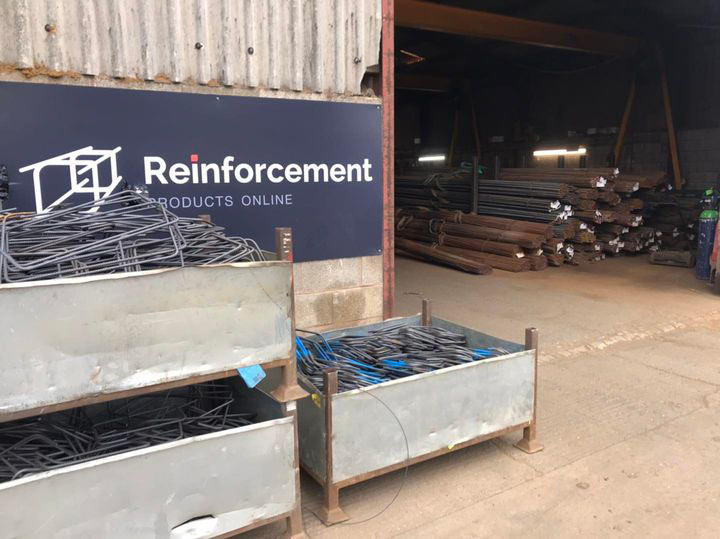We use cookies to make your experience better. To comply with the new e-Privacy directive, we need to ask for your consent to set the cookies. Learn more.
Understanding Rebar Weights

No matter what type of construction project you are considering, the chances are that you will need rebar or reinforcement mesh products to provide tensile strength to any poured concrete or slab elements of your build.
While concrete itself has high compressive strength, it is relatively weak when it comes to tension, and that’s where rebar products come in - since steel and concrete have very similar thermal coefficients, they make the perfect partners in construction projects, to produce slabs and masonry components that are strong, sound and long-lasting.
It’s important to understand how different types and weights of rebar influence the tensile strength of the concrete elements used.
Most rebar products are made from mild steel, and the quality of that steel is governed by British standards and regulations. For loose rebar, the relevant standard is and for steel mesh products, the standard is BS 4483: Steel fabric for the reinforcement of concrete.
The Composition of Rebar
Rebar steel is made of iron, with very small amounts of carbon, manganese, phosphorous, and sulphur also included. The carbon element is what gives rebar its overall quality and tensile strength. Mild cold-pressed steel typically has a carbon content of around 0.25%, whereas higher-grade hot-rolled steel will have a carbon content closer to 0.40%.
Rebar Surface Deformation
As well as the material composition of rebar, its overall weight per linear metre is also influenced by its diameter and by the surface deformation, or patterning, on the particular type of rebar length or mesh sheet.
By surface deformation, we mean that the outer surface of the rebar has been worked into a specific pattern to provide better contact with the poured concrete, thereby increasing the overall structural strength of the slab or concrete form.
The patterning on a particular type of rebar may not make a material difference to its overall tensile strength when compared with other patterns. Still, it could make a difference to the weight of each length, so it is important to calculate weights accurately.
The table below indicates the weights of the most common types and diameters of rebar, to highlight how much these vary for different projects.
Deformed Reinforcing Steel Rebar Weight
| Rebar Diameter | Weight in Kg/m | Weight in Kg/ft |
|---|---|---|
| 6mm | 0.222 Kg/m | 0.068 Kg/ft |
| 8mm | 0.395 Kg/m | 0.120 Kg/ft |
| 10mm | 0.62 Kg/m | 0.189 Kg/ft |
| 12mm | 0.89 Kg/m | 0.271 Kg/ft |
| 14mm | 1.21 Kg/m | 0.369 Kg/ft |
| 16mm | 1.58 Kg/m | 0.482 Kg/ft |
| 18mm | 2 Kg/m | 0.610 Kg/ft |
| 20mm | 2.47 Kg/m | 0.753 Kg/ft |
| 22mm | 2.98 Kg/m | 0.908 Kg/ft |
| 25mm | 3.85 Kg/m | 1.173 Kg/ft |
| 28mm | 4.83 Kg/m | 1.472 Kg/ft |
| 32mm | 6.31 Kg/m | 1.923 Kg/ft |
| 40mm | 9.87 Kg/m | 3.008 Kg/ft |
Of course, if you need any guidance or advice on the right rebar or mesh products for your next construction project, just get in touch with us today for a chat with a member of our friendly and experienced team.

Looking for Steel Reinforcement?
Look no further. Competitive Rates, Experienced Team, Rapid Delivery.
Of course, if you need any guidance or advice on the correct rebar or mesh products for your next construction project, just get in touch with us today for a chat with a member of our friendly and experienced team.
Frequently Asked Questions
How much does a rebar weigh?
The easiest weight calculator you can use to establish your reinforcing bar weight is to measure per linear foot or metre. The weight ranges from 0.222kg per metre (0.068Kg per foot) for 6mm rebar, to 9.87Kg per metre (3.008Kg per foot) for 40mm rebar.
How do you calculate rebar weight?
Trying to calculate rebar weight can be quite tricky, especially for those of us without a master's in mathematics!
However, it is crucial. Otherwise, your construction project could come under significant jeopardy.
Fortunately, there is a simple equation you can use that will solve any issues you might have!
W= (D2/162.28)* L
“D” stands for diameter, and “L” stands for length. Using this equation, you establish the diameter in millimetres and the length in metres. The result you get is in kilograms and will help you establish the weight of your rebar.
What is the unit weight of steel rebar?
For a breakdown of the weight of your rebar, you must know the shapes and lengths of your bars.
Once you have that information, use our weight calculator to establish exact figures.
How heavy is 16mm rebar?
A 16mm rebar weighs 1.58 kg/m. That equates to 480g per foot, or 2.07ft per kg.
Extrapolating this:
A 3m length of 16mm rebar will weigh 4.74Kgs
A 6m length of 16mm rebar will weigh 9.48Kg.






